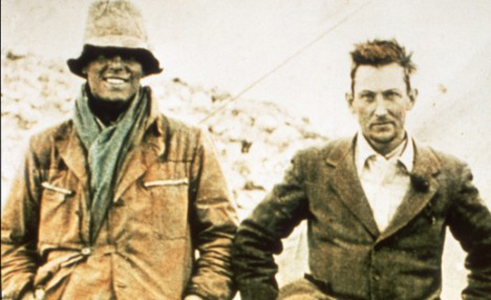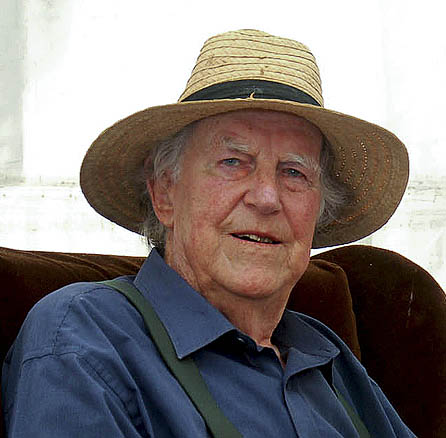
George Mallory, right, and Andrew Irvine
The simmering controversy over who was the first to tread on the world’s highest peak has been re-ignited, thanks to the unlikely intervention of a convicted liar.
Lord Archer’s latest literary effort, Paths of Glory, a fictional account of the life of Everest mountaineer George Mallory, has incensed some New Zealanders by claiming Mallory was the first man to conquer the Himalayan peak. Lord Archer, formerly Conservative party chairman Jeffrey Archer, was jailed in 2001 for perjury and perverting the course of justice.
Baron Archer of Weston-super-Mare’s latest tome is based on the reading of numerous books on Everest while he was incarcerated at Her Majesty’s Pleasure.
Archer convinced himself that it was most likely that Mallory had reached the summit in 1924 and wove his book around that theorem, adding a little homoerotic interest between him and his fellow climber Andrew Irvine and a romantic notion that another love rival to Mallory’s wife was Sagarmatha or Chomolungma, the Earth Mother or Saint Mother according to the mountain’s Tibetan and Nepalese names.
The former Tory MP for Louth claims his friend athlete Chris Brasher, founder of the boot company that bore his name, convinced him that Mallory beat Kiwi Sir Edmund Hillary to the roof of the world by 29 years.
This has caused outrage in New Zealand and is seen by many as an attack on the ‘colonial’ who beat the Brits to the summit.

Sir Edmund Hillary. Photo: Graeme Mulholland
The Sunday Star-Times newspaper reported mountaineer Graeme Dingle as saying: “’He’s dreaming. There’s essentially no chance Mallory got to the top.
“The English were desperate to get to the top, and they didn’t get there, even in 1953. I think the English are pretty sensitive about it.”
Archer’s thesis is centred on the fact that Mallory promised his wife Ruth he would leave her photograph on the summit. When Conrad Anker, during a 1999 expedition to locate the Englishman’s remains on the mountain, found his body and extracted Mallory’s wallet from the inside pocket of his jacket, there was no photograph to be found.
Yet no proof exists that Mallory made it to the top before he and Irvine perished on the peak. Irvine’s body has never been found, nor has the camera that Mallory had with him on his quest to climb the 8,848m (29,029ft) mountain.
Further antipodean ire is raised by the fact that George Finch, an accomplished Australian mountaineer who had already reached high altitude on Everest, was excluded from Mallory’s Royal Geographical Society expedition in favour of Irvine, boosting claims that Sandy Irvine got the place because Mallory had romantic intentions towards him.
The arguments could be settle later this year if Graham Hoyland’s latest expedition in search of Mallory and Irvine evidence turns up the missing camera containing proof of the pair’s summit conquest.
In the meantime, Archer has stirred up an old colonial hornet’s nest with his romanticised novel which will no doubt swell his depleted coffers while infuriating many in the mountaineering community.
Jestor_1
16 March 2009It's highly unlikely that Mallory made it to the summit of Everest on June 8, 1924. Romantic inclinations cause many theorists to weave the circumstancial evidence to place him there, but the hard evidence clearly indicates they both perished well before reaching the top, probably while hurriedly descending in the afternoon snow storm. There's a new, detailed theory that will be published by the original M&I historian, Tom Holzel, on the Explorer's Web website in a few days. I think you'll enjoy it.
Robin Evans
17 March 2009Good grief, why are the Kiwis so spiky? Archer is hardly a man of credibility or integrity.
Anand
31 March 2009With this article you just did what Jeffrey Archer did...why are you dismissing the notion that Mallory could've possible made it to the summit.
We can never be sure, and by saying that i'm not taking away Sir Edmund Hillary's achievements.
Tom Holzel
02 April 2009It is quite a bit more than "highly unlikely" that Mallory & Irvine (or even Mallory alone, taking Irvine's remaining oxygen) made it to thetop of Everest in 1924. Here's why:
1) Mallory had already exhausted himself in a previous assault a week earlier.
2) He had overdone his exertions in the early part of the expedition and complained of being terribly fatigued.
3) Carrying 2 bottles, they only had 8 hrs. of oxygen. Four hours were used-up before they even got to the First Step. The summit is at least six hours beyond that in excellent weather along fixed ropes, niether of which they had.
4) Conrad Anker fell off the Second Step when he tried to free climb it--and he's a 5.12 rated climber. He rated the 2nd Step as 5.10--much above Mallory's known skill level. (He lowered the rating after he was called on to ply Mallory in a film that have them succeeding. Everyone has a price...)
5) Legitimate environmental tests of exact replica clothing show that--contrary to Graham Hoyland's self-serving claims--it was only adequate down to 14F and no wind. At 2PM they were hit with a bitter squall which would have sent them into deadly hypothermia.
6) the rope-jerk injuries around mallory's waist prove the two were roped together when they fell at the ice ax site--thus proving mallory did not go off alone with Irvine's oxygen (the only conceivable way he could have reached the top).
See this and more at:http://www.mounteverest.net/news.php?id=17029
Peter Alexander
14 April 2009You don't need "romantic intentions" on Mallory's part -- or anyone else's, for that matter - to explain the exclusion of George Ingle Finch and the preference of Sandy Irvine for the expedition. It has been pretty well established that Finch was not of the appropriate class background for the blue-blood members of the Mount Everest Committee -- and was Australian besides. Consequently, the young but British, Oxford-Educated Irvine took the place that might have gone to Finch. Any attraction between Mallory and Irvine -- which is plausible but purely and only speculative -- would have happened later, after the expedition got under way and Mallory got to know Irvine. The real question is not why Irvine was picked for the expedition, but why Mallroy chose him as his partner on the final assault instead of the steady, experienced, and well-acclimated Noel Odell.
Nathalie
19 August 2009I think we all need to relax...this is a work of fiction...just based on a true story. It's a good read, that's all.
US Soldier
28 August 2009Let us trust the people who have climbed the mountain to give advice instead of arm chair QB's,,, opinions are ok, but let's look at evidence and not count out these brave men just yet.
bobby
19 January 2010the book is a bloody good read. I thing My archer is a fantastic writer and I love his stuff. Keep up the good work. why speculate- no one knows whether Mallory made it to the top or not. It can only be proven without doubt if (not when) the camera is found.
if someone wants to believe he got to the top and left his wife's picture there, then so what is wrong with that.
Krithi
29 March 2010Yet again a Great book by Archer...
Tom Holzel
17 April 2010Readers may enjoy reading my jaundiced review of Archer's "biography" of George Mallory at:
http://www.amazon.com/gp/cdp/member-reviews/A7HQMP5JGS9I3/ref=cm_cr_pr_auth_rev?ie=UTF8&sort%5Fby=MostRecentReview (2nd review down).
Mark Robinson
22 August 2011I think Mallory got to the summit but the Weather was too much on the way down and the lack of oxygen left....I hope the camera is found one day and it will prove what many believe and Mallory will be more than a legend!
Philip Gardiner
29 August 2011Mallory had a quickie with Irvine at the top